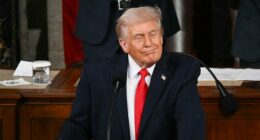Share this @internewscast.com
Unlock the Editor’s Digest for free
Concerns in Europe that Donald Trump might disengage the US from Nato would become “much less relevant” if all countries in the alliance hit their defence spending targets, said Grant Shapps, Britain’s defence secretary.
Trump — a declared Nato-sceptic, and also the presumptive Republican nominee in November’s US presidential election — has previously threatened to withdraw from the military alliance that guarantees Europe’s defence and security.
He has recently said he would encourage Russia to do “whatever the hell they want” to Nato countries that fail to hit their military spending target of 2 per cent of gross domestic product, while Russia’s rapid military rearmament has compounded European security worries.
Shapps said Russia’s rearmament under President Vladimir Putin “was a fact” and that it was “really important to be clear-eyed about the threats”, but added that the best way to guarantee European security would be if “more people paid in” to Nato.
“The first thing to say is that . . . [Nato’s] Article 5 is sacrosanct,” Shapps said, referring to the principle that an attack on one member of the alliance is seen as an attack on all members.
Shapps said Nato “since Putin’s invasion of Ukraine, has just got stronger, it’s got bigger . . . Some people say [more countries are paying more into Nato] because of what Trump said in his previous presidency. That may be true to an extent. I suspect the real reason that people are paying in is because they’re seeing a much more aggressive Putin,” he said.
“But we need all countries to step up,” added Shapps, because then the security concerns would become “much less relevant”.
With a defence budget of $54bn, equivalent to 2.1 per cent of GDP, the UK is Nato’s biggest military spender after the US in absolute terms. According to secretary-general Jens Stoltenberg, 18 of the alliance’s 31 members will meet the 2 per cent spending target this year, including Germany for the first time.
Shapps said a recent spate of warnings by European defence officials about Russia’s military build-up was not about “getting changes in [European] attitudes through scaremongering”.
Those warnings were not based on a new assessment of Russian intent, he said, but recognised that “Russia is on [a] war footing” and that all his European counterparts were “concerned about the same thing: if Putin was able to rebuild [Russia’s military], get a breakthrough in Ukraine potentially, but even without that, what would be he capable of?”.
Putin has called the collapse of the Soviet Union a “catastrophe” and expressed nostalgia for Russia’s imperial period. Shapps said: “He literally told us he was going to invade [Ukraine]. So it is no mystery that he would prefer to have a greater Russia.”
Shapps said the UK was working with 13 Nato allies and Sweden on two new initiatives focused on increasing the production of munitions and missiles to help Ukraine resist the Russian military and boost Nato stockpiles, but he provided no details.
He also downplayed a recent suggestion made by General Sir Patrick Sanders, the outgoing head of the British Army, that the UK needed to build a “citizen’s army” to better face potential threats.
“We are not about to have a conscription army in the UK,” he said. “God forbid if we ended up in a world war, we would probably have to reconsider . . . But one of the things that makes our army very lethal is its professionalism.”
However, Shapps did stress that Britain’s armed forces, like many of its military partners, needed to improve recruitment and especially retention.
“Two threads are very clear to me,” he said. “First, you need to get more people applying and, what’s really great, we’re getting that now.” Shapps cited data that he claimed showed Royal Navy recruitment at an eight-year high and army recruitment at a six-year high, while recruits into the air force rose 42 per cent in January compared with last year.
Retaining personnel was the other important concern, he said, adding that it was essential that the UK armed forces recruited more women and rooted out misogyny and bullying. “Any organisation or society that thinks it’s a good idea to only use half its population is obviously crazy,” he said.







